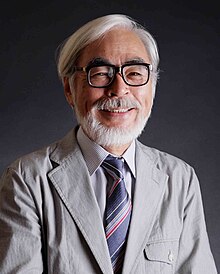
Back Hayao Miyazaki Afrikaans Hayao Miyazaki AN هاياو ميازاكي Arabic هاياو مييازاكي ARY هاياو ميازاكى ARZ Hayao Miyazaki AST Hayao Miyazaki Azerbaijani Hayao Miyazaki BCL Хаяо Міядзакі Byelorussian Хаяо Міядзакі BE-X-OLD
Hayao Miyazaki | |||||
|---|---|---|---|---|---|
宮崎 駿 | |||||
 Miyazaki in 2012 | |||||
| Born | January 5, 1941 | ||||
| Other names |
| ||||
| Alma mater | Gakushuin University | ||||
| Occupations |
| ||||
| Years active | 1963–present | ||||
| Employers |
| ||||
| Spouse |
Akemi Ōta (m. 1965) | ||||
| Children | 2, including Goro | ||||
| Relatives | Daisuke Tsutsumi (nephew-in-law) | ||||
| Japanese name | |||||
| Kanji | 宮崎 駿 | ||||
| |||||
| Signature | |||||
 | |||||
Hayao Miyazaki (宮崎 駿 or 宮﨑 駿, Miyazaki Hayao, Japanese: [mijaꜜzaki hajao]; born January 5, 1941) is a Japanese animator, filmmaker, and manga artist. A founder of Studio Ghibli, he has attained international acclaim as a masterful storyteller and creator of Japanese animated feature films, and is widely regarded as one of the most accomplished filmmakers in the history of animation.
Born in Tokyo City in the Empire of Japan, Miyazaki expressed interest in manga and animation from an early age. He joined Toei Animation in 1963, working as an inbetween artist and key animator on films like Gulliver's Travels Beyond the Moon (1965), Puss in Boots (1969), and Animal Treasure Island (1971), before moving to A-Pro in 1971, where he co-directed Lupin the Third Part I (1971–1972) alongside Isao Takahata. After moving to Zuiyō Eizō (later Nippon Animation) in 1973, Miyazaki worked as an animator on World Masterpiece Theater and directed the television series Future Boy Conan (1978). He joined Tokyo Movie Shinsha in 1979 to direct his first feature film The Castle of Cagliostro (1979) and the television series Sherlock Hound (1984–1985). He wrote and illustrated the manga Nausicaä of the Valley of the Wind (1982–1994) and directed the 1984 film adaptation produced by Topcraft.
Miyazaki co-founded Studio Ghibli in 1985, writing and directing films such as Laputa: Castle in the Sky (1986), My Neighbor Totoro (1988), Kiki's Delivery Service (1989), and Porco Rosso (1992), which were met with critical and commercial success in Japan. Miyazaki's Princess Mononoke (1997) was the first animated film to win the Japan Academy Film Prize for Picture of the Year and briefly became the highest-grossing film in Japan; its Western distribution increased Ghibli's worldwide popularity and influence. Spirited Away (2001) became Japan's highest-grossing film and won the Academy Award for Best Animated Feature; it is frequently ranked among the greatest films of the 21st century. Miyazaki's later films—Howl's Moving Castle (2004), Ponyo (2008), and The Wind Rises (2013)—also enjoyed critical and commercial success. He retired from feature films in 2013 but later returned to make The Boy and the Heron (2023), which won the Academy Award for Best Animated Feature.
Miyazaki's works are frequently subject to scholarly analysis and have been characterized by the recurrence of themes such as humanity's relationship with nature and technology, the importance of art and craftsmanship, and the difficulty of maintaining a pacifist ethic in a violent world. His protagonists are often strong girls or young women, and several of his films present morally ambiguous antagonists with redeeming qualities. Miyazaki's works have been highly praised and awarded; he was named a Person of Cultural Merit for outstanding cultural contributions in 2012, and received the Academy Honorary Award for his impact on animation and cinema in 2014. Miyazaki has frequently been cited as an inspiration for numerous animators, directors, and writers.
© MMXXIII Rich X Search. We shall prevail. All rights reserved. Rich X Search